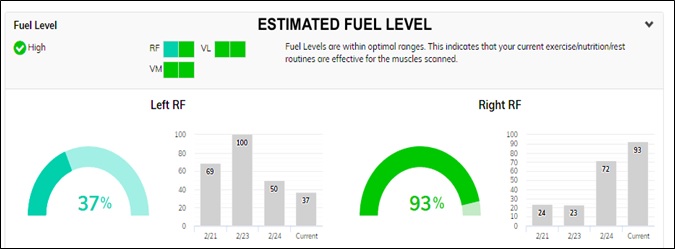Along with our new scoring comes a new set of terms. Estimated Fuel Level (EFL) which is one of two elements (together with Muscle Fuel Rating) that makes up we call Muscle Energy Status (MES).
Overview
The ‘fuel’ that muscles use for exercise is predominantly made up of glycogen. However, other muscle constituents that contribute to energy production, such as protein, carnitine and creatine can also be regarded as part of this fuel. Like glycogen, these elements are also bound to water and can potentially be seen on the ultrasound scan used to estimate a muscle’s Estimated Fuel Level.
Definition
Estimated Fuel Level (EFL) is an assessment of the level of energy (fuel) stored in a muscle at any given time.
Example
The graph above uses a ‘Fuel Tank’ analogy to display the level of energy (fuel) stored in the Rectus Femoris (RF) as a ‘percent full’. It also shows how EFL can be tracked historically from session to session.
How do we obtain EFL scores?
- We determine the highest and lowest fuel scores for a particular muscle by analyzing scans taken in different situations (e.g. pre and post exercise)
- We then calculate the tank’s capacity by representing the individual’s greatest obtained fuel score as an Estimated Fuel Level (EFL) of 100%, and their lowest obtained fuel score as an EFL of 0%.
- All future scores for that muscle are then calculated as a ‘percentage level’ of that fuel tank capacity (i.e. EFL = Estimated ‘% full of fuel’ Level)
- As more data is collected, the maximum and minimum fuel tank levels for that same muscle may change.
- For example, if the muscle achieves a new highest score, this will become the new estimated maximum capacity (100% EFL) for the muscle’s fuel tank.
- In the same way, a new lowest score will become the new estimated minimum capacity (0% EFL).
- This automatic updating process enables the muscle tank’s estimated capacity to become more compatible with the physiological uniqueness of the person being scanned.
NOTE: EFL must be calculated after a range of scores has been established.
EFL is a ‘state’ measure – a score that reflects the current ‘state’ of a muscle’s fuel level at the time the measure is taken. State measures are dynamic and can change on a day-to-day, or even scan-to-scan basis (e.g. pre-post exercise).
Why Is EFL Important?
- To Gauge Readiness For Exercise/Activity
- To Monitor Fuel Usage After Exercise/Activity
- To Track Recovery in time for the next event
- Answer the question, “How full is my tank?”
Take Home Message: EFL provides non-invasive, real-time, individualized measures of muscle fuel levels. EFL can change often according to factors such as muscle size, fitness, nutrition, fatigue, and training status
In Practice
Read this great case story to understand how EFL looks and is used in practice.

